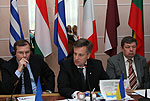Kyiv hosts senior-level defence and security sector reform meeting

A senior-level meeting of the NATO-Ukraine Joint Working Group on Defence Reform (JWGDR) took place in Kyiv on 26 June.

A senior-level meeting of the NATO-Ukraine Joint Working Group on Defence Reform (JWGDR) took place in Kyiv on 26 June.
At the top of the agenda was a discussion of how the JWGDR’s activities could contribute to NATO’s intensive engagement with Ukraine that was launched at NATO’s Bucharest Summit.
A first assessment of Ukraine’s Membership Action Plan (MAP) application will be made by foreign ministers in December. Defence and security sector reform is one of the key areas in which Ukraine’s progress will be judged. The JWGDR will therefore intensify cooperation in key priority areas, which are likely to have a systemic influence on Ukraine’s security sector.
The JWGDR also emphasized the importance of ensuring effective national coordination of NATO-Ukraine cooperation and of dedicating adequate resources to reform efforts.
No reforms can take place without qualified personnel to implement them. This is why the JWGDR’s programme for the professional development of civilian personnel employed in Ukrainian security institutions is so important.
Developing a pool of highly qualified civilians is essential to strengthen Ukraine’s capacity for democratic management and oversight of its security sector, which, in turn, has a positive impact on the country’s Euro-Atlantic integration policy.
Since the programme was launched in 2005, over 350 officials have participated in a total of 85 activities, representing over 7500 course days of professional development. During the meeting in Kyiv, NATO countries announced further in-kind and financial contributions to support the continued implementation of the programme.
The involvement of civil society in the development and oversight of national security and defence policies and reforms is an important measure of a truly democratic society.
The JWGDR-sponsored Partnership Network for Civil Society Expertise Development is aimed at facilitating the development of links between Ukraine’s security institutions and civil society. It provides a framework for interaction between civil society groups and security practitioners in NATO countries and Ukraine to help build expertise in this area.
The Partnership Network has set up a number of task forces to work on specific issues ranging from Euro-Atlantic integration and human rights to issues related to defence and security sector reform and the defence industry.
In Kyiv, the JWGDR discussed plans for strengthening the Network and preparations for the next meeting of the Network in Poland, in September.
Success in the area of intelligence sector reform remains one of the most important factors in assessing overall progress in Ukraine’s security sector transformation.
Impressive results have already been achieved by the NATO-Ukraine Working Group on Civil Democratic Control of the Intelligence Sector between its launch in October 2006 and April 2008. Key achievements include the deepened cooperation and building of trust between Allied and Ukrainian intelligence services, the drafting of a concept of reform for the Ukrainian Security Service (SBU) and a legislative framework of security and intelligence services in Ukraine.
According to its mandate given at the 2006 NATO-Ukraine High-Level Defence Consultations in Sintra, the Working Group has been now been disbanded. However, it was agreed that the work in this area will continue in the format of staff talks, initiated at the request of Ukraine on a case-by-case basis. The first staff talks on the specific issues of intelligence sector reform in Ukraine will be held in Latvia in September.

© SBU
The JWGDR members were invited by the SBU to visit the Koncha Zaspa Counter-Terrorist Centre on 27 June. They had a roundtable discussion of counter-terrorism-related aspects of Ukraine’s security sector reform and watched a demonstration of the capabilities of the SBU’s “Alfa” special operations teams.
The JWGDR also discussed how it could assist Ukraine’s reform efforts in a number of other key areas.
NATO will continue to support the implementation of Ukraine’s National Security Strategy and the National Security Sector Review, which are aimed at aligning Ukraine’s security sector more closely with Euro-Atlantic values. A JWGDR conference on the implementation of national security concepts is planned for October.
As part of its overall security sector review, Ukraine has also asked for Allied assistance in conducting its defence ministry’s headquarters review. The aim is to increase the ability to effectively formulate and implement defence policy and align its working practices and standards more closely with those of NATO.
The JWGDR also addressed the important role of the Ukrainian parliament in implementing defence and security sector reforms. This is increasingly important during the ongoing debates in Ukraine regarding the strategic direction of Ukraine’s security and defence policy. Since 2000, NATO has worked together with Ukraine’s Parliament and its National Security and Defence Council, the NATO Parliamentary Assembly and the Geneva Centre for Democratic Control of Armed Forces to organize regular seminars and conferences on parliamentary oversight of security and defence.
Finally, the JWGDR discussed preparations for the 2008 high-level NATO-Ukraine consultations in Tallinn, Estonia, which will bring together Ukrainian and Allied defence ministers and other senior security officials.